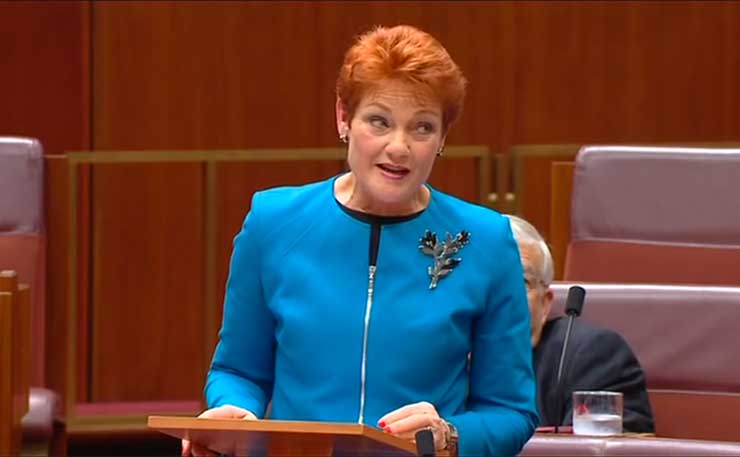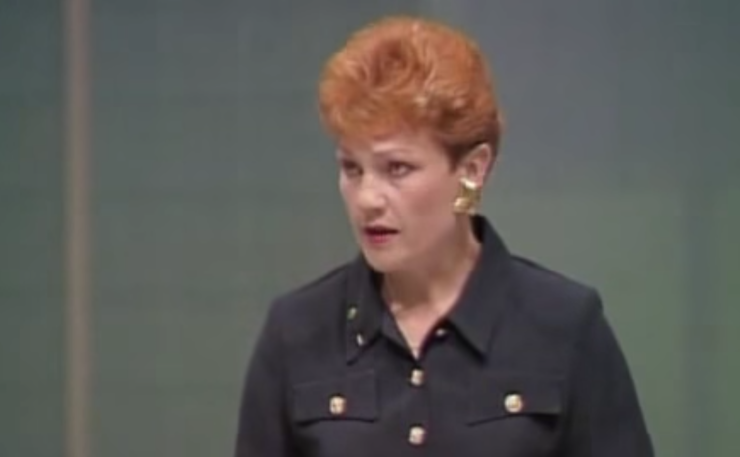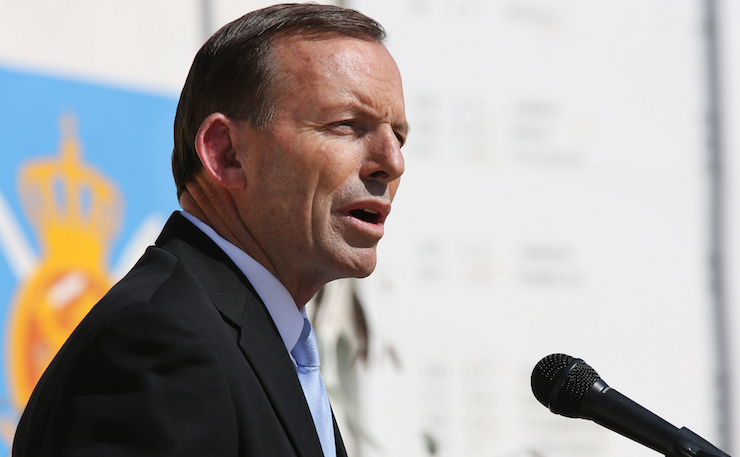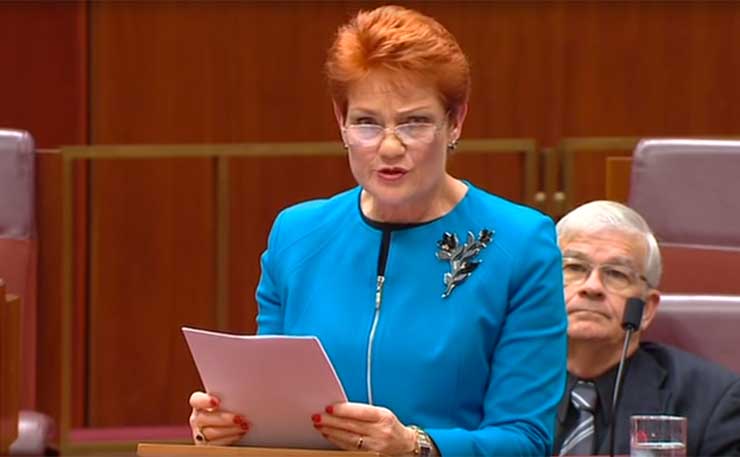Dripping with bigotry, there wasn’t much that was new in Pauline Hanson’s maiden speech to parliament. But there was at least one notable innovation, writes Michael Brull.
It’s official. She’s really back. Listening to Pauline Hanson speak in the Senate somehow makes her election seem more real and ugly. From an abstract sense of something sinister returning, now her return is tangible. She will be in the Senate, regularly giving speeches, and each which will bear an indelible mark in our Parliamentary records. 100 years from now, students will find those racist speeches, and try to make sense of them.
Some have struggled to understand Hanson’s popularity. She’s conspicuously inarticulate, and stumbled through much of her speech, most of which didn’t break any new ground.
Often boring, it seemed like a caricature of untested small-town common sense. It is as though a group of white people at a pub in a rural town had chatted about the things wrong with Australia. Finally, one of them worked up the nerve to do something about it, because those politicians in Canberra aren’t listening to people like us.
Though Hanson has been in politics for over 20 years, she hasn’t tried to learn much. Her speech was sprinkled with statistics, some of them dubious, but few ideas or abstract concepts. Much of it comes down to what “everyone knows”, and other unverified prejudices.
Above all, Hanson aims to speak for the ordinary (white) Australian against vested interests that threaten people like us. Hanson criticises foreigners, but she also criticises big business, multinationals, big banks, the Liberals, welfare cheats, women who torment their spouses, lawyers and more. She looks around small towns, and she sees misery, lack of infrastructure, vulnerable communities, and feels angry. Though at times she spreads the blame around, her remedies mostly involve looking down and kicking.
As she looks around and sees misery, she blames immigration, or welfare cheats. The solutions are usually to take from those below.

Take this passage, seemingly about general social problems:
“High immigration is only beneficial to multinationals, banks and big business, seeking a larger market while everyday Australians suffer from this massive intake. They are waiting longer for their life-saving operation. The unemployment queues grow longer—and even longer when government jobs are given priority to migrants. Our city roads have become parking lots. Schools are bursting at the seams. Our aged and sick are left behind to fend for themselves. And many cities and towns struggle to provide water for an ever-growing population. Our service providers struggle to cope, due to a lack of government funding, leaving it to charities to pick up the pieces. Governments, both state and federal, have a duty of care to the Australian people. Clean up your own backyard before flooding our country with more people who are going to be a drain on our society. I call for a halt to further immigration and for government to first look after our aged, the sick and the helpless.”
Hanson begins with big business selling out “everyday Australians”. Then it’s migrants getting priority for jobs. After describing the problems more, suddenly the solution isn’t more social spending. It’s stopping immigration.
Whether or not this kind of policy would ever be implemented (it won’t), Hanson advocates a cultural argument, which would consume so much energy if it were ever taken seriously, that none of the social problems she identifies would even get considered.
Whilst Hanson starts with a critique of big business, they escape from her scrutiny without a scratch.
For plenty of Australians, the grievances she cites will resonate. Senator Kim Carr recently noted on New Matilda that Hanson’s vote was strongest in the outer suburbs and regional areas of Australia. Many of those voters will recognise Hanson’s grievances, and be glad someone is voicing their pain.
There is also another correlation worth noting. From my analysis of electorates that voted for Hanson, there was a strong correlation between areas with low year 12 completion rates, and support for One Nation. If my analysis is correct, this also squares with a 2015 study on Islamophobia which found that those who didn’t complete year 12 are “about 70 per cent more likely to be Islamophobic.”
Hanson may be the perfect politician to appeal to that demographic. Her unpolished and inarticulate presentation may even be an asset. Her surly defiance when fronting media who poke holes in what she says bewilders some journalists. Why don’t Hanson supporters care?
I would suggest that many of her supporters identify with Hanson in those surly moments. Most of us have had the experience of talking to someone who presents as smooth, articulate, and full of fancy jargon and obscure references. As clever as they seem, you’re convinced their argument is still somehow wrong.
You listen to them quietly, unable to quite follow what they’re saying, or to explain why they’re wrong, and finally you leave the conversation frustrated and resentful.
Hanson embodies that frustration. She may not be able to exactly explain what she means, she may get a few things wrong here and there, but she knows she is right. For those who buy into her framing and values, the slips seem trivial.
Above all, Hanson is a patriot. Her patriotism was instilled in her “from an early age”. She watched the flag getting “raised every morning at school”, she sang the anthem, and she watched Olympians on the podiums.
For Hanson, even “belonging, respect, and commitment to fight for Australia” are under threat by immigrants. They want to take away her values, for the “mantras of diversity or tolerance”. Hanson believes Australia had a national identity before it became Australia in Federation, and it was based on “belonging”. It had “nothing to do with diversity”.
As for belonging, Hanson regards this as a kind of aggressive value, to be imposed on intruders. The only tolerance Hanson believes in is foreigners coming here and tolerating us. If they can’t “become Australian and give this country your undivided loyalty, obey our laws, respect our culture and way of life, then I suggest you go back to where you came from”.
Hanson is happy to welcome people from other races, so long as they stop being different and assimilate. In what she may regard as a generous move, she claims that, “I welcome them from the bottom of my heart. As they integrate and assimilate, the disruption caused by diversity diminishes.”

Consider that for a moment. The disruption caused by diversity, which it seems Hanson deplores.
One of the big causes of her speech was welfare cheats. She wants single mothers to only get welfare for their first child. She urges women to “Get a job and start taking responsibility for your own actions”. She worries about Muslim men with multiple wives collecting thousands in welfare every week. She plans to address some of the welfare cheating with ID cards with electronic fingerprints.
Perhaps most strange is Hanson’s solicitousness for men oppressed by the legal system. She claims that three men and “occasionally a woman” commit suicide every day due to family breakdowns. I expect experts to weigh in on this factoid, but I haven’t found any substantiation for it.
Hanson claims that women in custody battles make “frivolous claims” and use children as “pawns”. Alas, the legal system doesn’t treat “mums and dads with the same courtesy and rights”. Astonishingly, Hanson blames the legal system’s oppression of men for “murders due to sheer frustration and depression and mental illness caused by this unworkable scheme”. This seems a rather creative defence for the men who murder women. It is possible that Hanson has simply expressed herself poorly, and will walk back that particular claim.
Ultimately, the centrepiece of Hanson’s speech was her anti-Muslim raving. Much of it is more or less unoriginal. She says too many Australians “live in fear of terrorism”. Muslims have higher imprisonment rates, higher unemployment rates, and engage in anti-social behaviour. Muslim men have a “misogynist culture”. Muslim refugees are involved in terrorist attacks. Muslim leaders are “deafening with their silence, or lack of sympathy”. Some schools don’t sing Christmas carols anymore. Women wear the burqa whilst getting drivers licenses. The burqa should be banned, and even “two of our former prime ministers” find burqas “confronting”.
It’s worth noting, much of that could have been said by Tony Abbott.

Hanson moved on to critique Islam, which is also a signature position of Abbott. Hanson says Islam “does not believe in democracy, freedom of speech”, or “separate religion from politics”. It has a “political agenda”, and regulates Muslim’s “total life”. Indeed, “Islam sees itself as a theocracy”.
Hanson blasts Halal certification, which she claims isn’t a “religious requirement but a moneymaking racket”. It turns out, all it takes for non-halal products to be consumed is for the word “Bismillah” to be “said over the food and a prayer is recited”.
She claims that Muslims want to see “sharia law introduced in Australia”. Islam itself is a menace, as “Islam cannot have a significant presence in Australia if we are to live in an open, secular and cohesive society.” Hanson calls for stopping Muslim immigration (Kruger, Bolt).
Again, much of this isn’t really ground-breaking for Islamophobia in Australia. Hanson warned that we’re in danger of being “swamped by Muslims”, which was really just Hanson reliving her greatest hit about Asians. Telling people to go back to where they came from is just another cliché of Australian racism. She wants no new mosques or schools. This will hearten the already existing vibrant campaign of racists across Australia who fight against each new Muslim school and mosque. Even the monitoring suggestion sounds familiar.
But there were some innovations in her maiden speech, and I think Hanson’s most toxic was also her most overtly racist moment: “Radicalisation is happening on our streets, in our suburbs and mosques. Yet, our leaders continue to tell us to be tolerant and embrace the good Muslims. But how should we tell the difference? There is no sign saying ‘good Muslim’ or ‘bad Muslim’. How many lives will be lost or destroyed trying to determine who is good and who is bad?”
That’s in a speech broadcast around Australia. That’s in Hansard. That’s our Senator for six more years, explaining that we shouldn’t be tolerant of Muslims. How can we tell the difference between the good ones and the bad ones?
Most ordinary racists admit the possibility of exceptions. Hanson seems reluctant to go that far. Her crude hatred and suspicion applies to all Muslims. She not only explicitly refuses to distinguish “good” from “bad”, but claims that lives will be “lost or destroyed” by those attempting to even distinguish them.
This is an argument for suspicion of all Muslims. Racism can’t really get more blatant and straightforward than that.
Hanson isn’t the only racist in the Senate. But the fact she makes no effort to hide or sugarcoat her bigotry is something new. Rather than merely presenting a racist position, she’s presenting an assault on the ideal of anti-racism. And the government’s desperate need for Senate votes means they are in no position to offer principled opposition to Hanson’s bigotry, even if they wanted to.
This may be the perfect storm for Hanson’s racism. And the storm is only just beginning.
Donate To New Matilda
New Matilda is a small, independent media outlet. We survive through reader contributions, and never losing a lawsuit. If you got something from this article, giving something back helps us to continue speaking truth to power. Every little bit counts.





